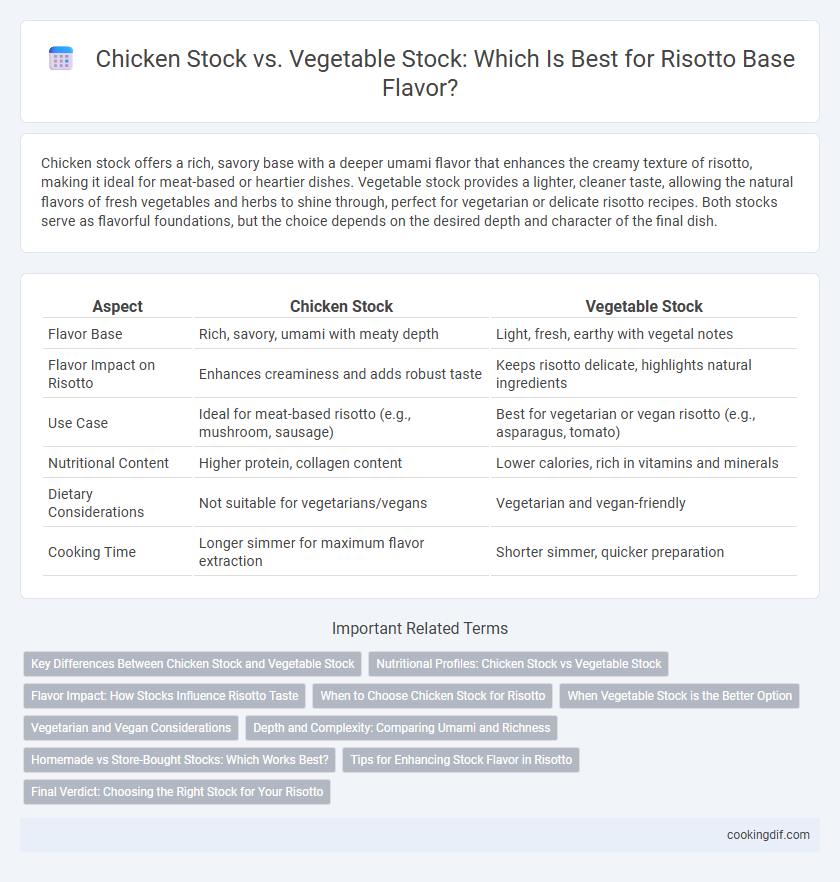Chicken stock offers a rich, savory base with a deeper umami flavor that enhances the creamy texture of risotto, making it ideal for meat-based or heartier dishes. Vegetable stock provides a lighter, cleaner taste, allowing the natural flavors of fresh vegetables and herbs to shine through, perfect for vegetarian or delicate risotto recipes. Both stocks serve as flavorful foundations, but the choice depends on the desired depth and character of the final dish.
Table of Comparison
| Aspect | Chicken Stock | Vegetable Stock |
|---|---|---|
| Flavor Base | Rich, savory, umami with meaty depth | Light, fresh, earthy with vegetal notes |
| Flavor Impact on Risotto | Enhances creaminess and adds robust taste | Keeps risotto delicate, highlights natural ingredients |
| Use Case | Ideal for meat-based risotto (e.g., mushroom, sausage) | Best for vegetarian or vegan risotto (e.g., asparagus, tomato) |
| Nutritional Content | Higher protein, collagen content | Lower calories, rich in vitamins and minerals |
| Dietary Considerations | Not suitable for vegetarians/vegans | Vegetarian and vegan-friendly |
| Cooking Time | Longer simmer for maximum flavor extraction | Shorter simmer, quicker preparation |
Key Differences Between Chicken Stock and Vegetable Stock
Chicken stock offers a richer, more savory base flavor with higher umami due to its meat and bone content, which enhances the depth of risotto. Vegetable stock provides a lighter, more subtle taste with a fresher, slightly sweet vegetable essence, making it ideal for vegetarian or delicate-flavored risottos. The choice between chicken and vegetable stock significantly influences the final dish's flavor complexity and suitability for dietary preferences.
Nutritional Profiles: Chicken Stock vs Vegetable Stock
Chicken stock provides higher protein content and essential amino acids that support muscle repair and immune function, while vegetable stock offers a lower-calorie option rich in antioxidants, vitamins, and minerals such as potassium and vitamin C. The collagen and gelatin in chicken stock contribute to a richer texture and aid joint health, whereas vegetable stock supplies fiber and plant-based phytonutrients that promote cardiovascular wellness. Choosing between the two depends on dietary preferences and nutritional goals, with chicken stock favoring protein intake and vegetable stock emphasizing vitamins and antioxidant benefits.
Flavor Impact: How Stocks Influence Risotto Taste
Chicken stock imparts a rich, savory depth with subtle umami notes that enhance risotto's creamy texture and overall flavor complexity. Vegetable stock offers a lighter, earthier base, allowing the natural taste of the rice and added ingredients like mushrooms or asparagus to shine without overpowering. Choosing chicken stock results in a more robust, hearty risotto, while vegetable stock provides a delicate, fresh profile, catering to different dietary preferences and flavor goals.
When to Choose Chicken Stock for Risotto
Chicken stock provides a rich, savory depth perfect for meat-based risottos or those featuring poultry, enhancing overall flavor complexity. When making risotto with mushrooms, chicken, or Parmesan, its natural umami elevates the dish beyond what vegetable stock offers. Use chicken stock when a robust, full-bodied broth is desired to complement hearty ingredients and add warmth to creamy risotto.
When Vegetable Stock is the Better Option
Vegetable stock is the better option for risotto when a lighter, more delicate flavor profile is desired or when preparing a vegetarian or vegan dish. Its subtle, fresh vegetable notes allow the primary ingredients, such as mushrooms or seasonal vegetables, to shine without overpowering the dish. Using vegetable stock also provides a versatile base that complements herbaceous and aromatic additions, enhancing the overall depth of the risotto.
Vegetarian and Vegan Considerations
Vegetable stock is the preferred choice for vegetarian and vegan risottos because it provides a rich, plant-based flavor without animal-derived ingredients, ensuring the dish remains suitable for these diets. Chicken stock, while adding a deeper umami taste, contains animal products that exclude strict vegetarians and vegans. Using a well-seasoned vegetable stock with mushrooms, herbs, and aromatics enhances the risotto's complexity while maintaining its plant-based integrity.
Depth and Complexity: Comparing Umami and Richness
Chicken stock offers a deeper umami flavor and richer mouthfeel due to its animal-based collagen and amino acids, enhancing risotto's overall depth and complexity. Vegetable stock provides a lighter, fresher profile with subtle earthiness, often lacking the same level of savory intensity found in chicken stock. For a robust and layered risotto, chicken stock remains the preferred choice, while vegetable stock suits lighter, herb-forward variations.
Homemade vs Store-Bought Stocks: Which Works Best?
Homemade chicken stock offers a richer, more complex base for risotto, with deep umami flavors from slow-simmered bones and vegetables, enhancing the dish's overall taste profile. Vegetable stock, especially when homemade, provides a lighter, fresher essence, allowing subtle ingredients like saffron or mushroom to shine without overpowering the risotto. Store-bought stocks often contain added sodium and preservatives, which can dilute the natural flavors and complicate balancing seasoning in the final dish.
Tips for Enhancing Stock Flavor in Risotto
Using chicken stock in risotto delivers a rich, savory depth, while vegetable stock offers a lighter, more delicate base ideal for vegetarian dishes. To enhance stock flavor, simmer with aromatics like garlic, onion, celery, and fresh herbs such as thyme and bay leaves, boosting the umami profile. Reducing the stock slightly before adding it to risotto concentrates the flavors, creating a more robust and satisfying taste in every bite.
Final Verdict: Choosing the Right Stock for Your Risotto
Chicken stock imparts a rich, savory depth that enhances the creamy texture of risotto with a robust umami profile, making it ideal for meat-based or hearty risottos. Vegetable stock offers a lighter, more delicate flavor that highlights fresh and herbaceous notes, perfect for vegetarian or seafood risottos seeking subtle complexity. The final choice depends on the dish's overall ingredients and desired intensity, with chicken stock providing boldness and vegetable stock ensuring a clean, versatile base.
Chicken stock vs vegetable stock for base flavor Infographic

 cookingdif.com
cookingdif.com